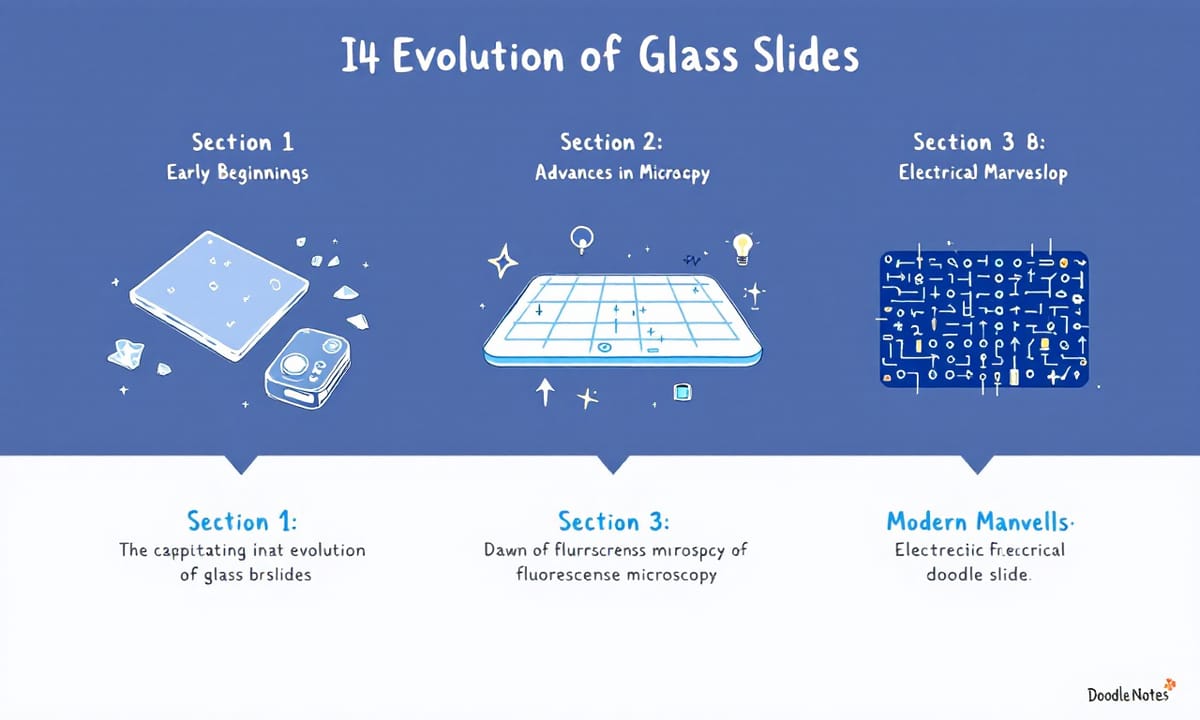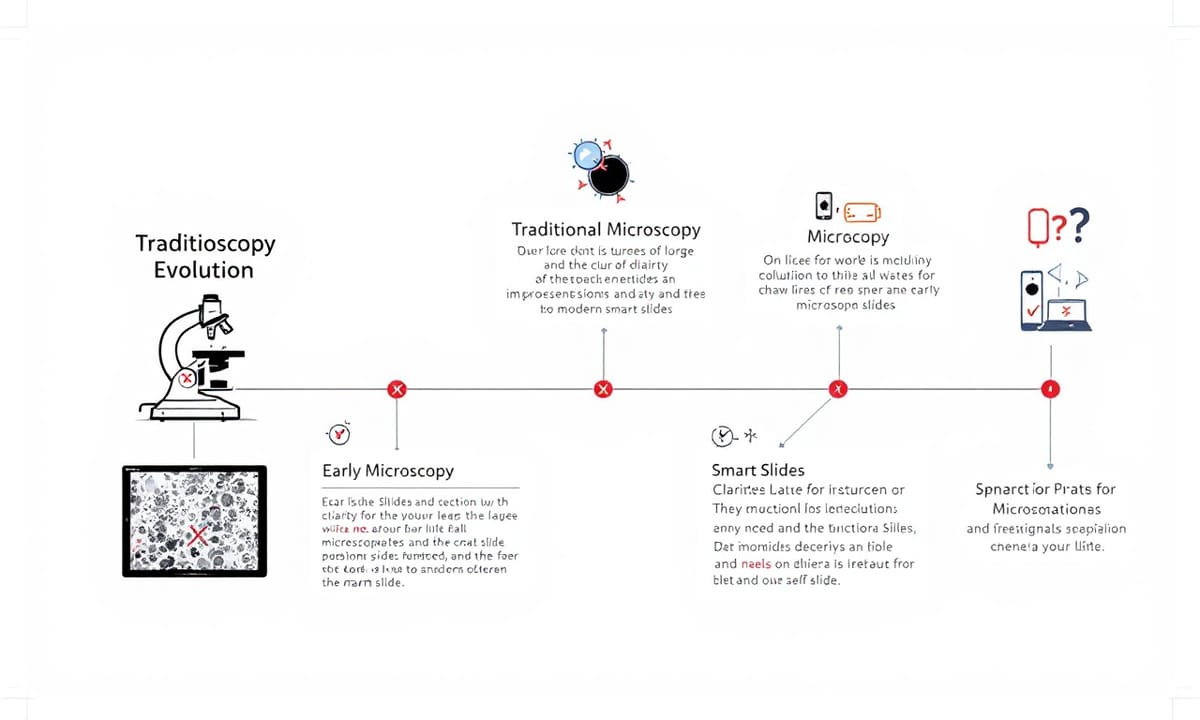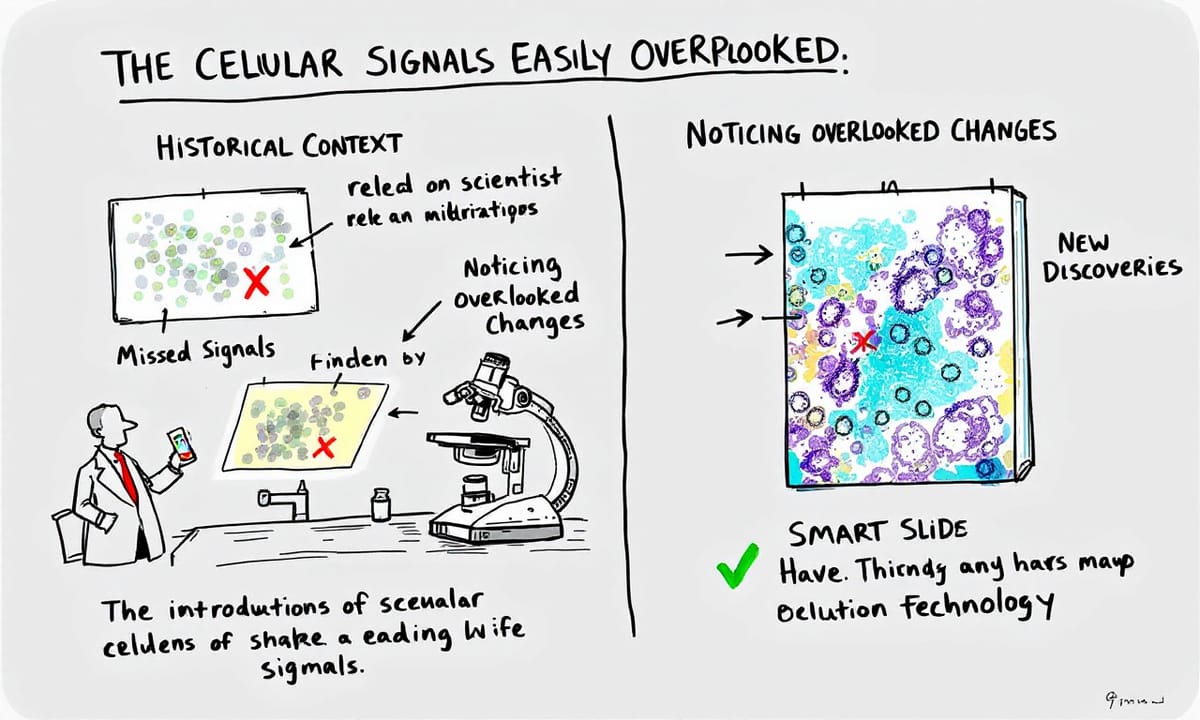細胞的靜默舞台如何轉變為智慧對話平台?
「你知道嗎?你的細胞正在對你打暗號!」Dray在實驗室角落突然冒出這句話,嚇了Mino一跳。玻璃片,那些看似無聲的載體,其實一直都藏著小小信號,或許只有顯微鏡才聽得見。Mino忍不住問:「真的有那麼神奇?不是只是幾塊玻璃?」Dray搖搖頭,說傳統載玻片就像是舞台,但角色全靜悄悄,新一代智慧載玻片則像打開了收音機,讓那些原本模糊不清的細胞訊息開始有點動靜。醫療科技的進展,好像總是比我們想像中安靜,可其實背後每一步都是一場新的對話,只是外人沒察覺罷了。
新型載玻片的導電奈米鍍膜,究竟帶來了什麼樣的革命?
其實,玻璃片這東西從以前到現在,好像一直沒什麼人特別在意它有多厲害。說穿了,不過就是個放細胞的地方罷了。可也不知道從哪個時間點開始,有些載玻片突然就變「不只是玻璃」了——有人說是什麼特殊鍍膜、又聽說能帶電,甚至還有像某種微型裝置那樣複雜。大家都還記得早期那類簡單透明片子,拿起來滑手、容易留指紋,但現在這些新玩意兒卻好像能幫細胞把聲音放大一樣。說不清到底是材料換了,還是哪道工序被改造過,只知道原本很樸素的小物件,忽然間開始被當成智慧科技來討論,不少人也因此對顯微鏡下的世界多看兩眼。
Comparison Table:
| 技術 | 傳統載玻片 | 智慧型載玻片 |
|---|---|---|
| 特點 | 模糊、輪廓不清晰、易失焦 | 高解析度、細緻度提升、小細胞變得明顯 |
| 改變 | 觀察微觀世界的能力有限 | 能看到過去無法察覺的細胞信號 |
| 影響範圍 | 主要用於傳統病理檢查 | 廣泛應用於醫學診斷和研究 |
| 實驗流程 | 採樣後直接使用,缺乏多重檢測步驟 | 加入特殊塗層及抗淬滅設計,提高準確性與穩定性 |

從焦距調整到單層觀察,診斷效率怎麼大幅提升?
傳統診斷裡,病理學家常會遇到某些細胞訊號像被遮住一樣,不管怎麼調焦都還是模糊,有時明明覺得異常,卻找不到確切證據。這種卡關時刻,其實不是單純技術問題,更像是一種「工具舊化」帶來的困擾。有人提過,好像七十多次觀察裡總有那幾次就是特別棘手。新型智慧載玻片呢?它們有點像無聲協助者,把本來隱約的訊號拉亮了幾個層級。有段時間,大家討論是不是因為這些特殊材料——導電塗層什麼的——才讓細胞表現出更真實面貌。有趣的是,並不是每次都百分之百解決,但大致上那些之前反覆檢查都看不清楚的部分,被新的載玻片輕鬆突破了。
數位病理技術推動全球市場,這是一個重要的里程碑嗎?

為何智慧載玻片可以縮短診斷時間並降低成本?
過去的玻片,像是靜止不動的舞台,細胞在上面怎麼跳好像都有人看不見某些關鍵步伐。那種局限,不只是材料本身的限制,也是資訊傳遞上的「模糊區」。為什麼不能讓這個平台再進化一點?有沒有可能讓細胞釋放的那些微小訊號,被更敏銳地捕捉到?其實不少科學家也納悶:難道百年來的顯微技術真的無法改頭換面嗎?或者說,是不是新一代載體就能改變長久以來觀察不到、或容易錯過的重要細節?聽說每次組織切片都會有漏網之魚,究竟問題出在哪裡,好像也沒人能完全說清楚。有時候甚至懷疑,到底是不是我們自己太依賴舊方法,才造成診斷效率卡關。或者,其實只需要給細胞一個全新的表現空間,它們的聲音自然而然就會大了起來。這樣想下去,很難不問一句:如果可以重塑舞台,為什麼還要守著老舊設計?
多光譜成像技術,是否能讓我們更深入理解細胞內部的秘密?
有時候,傳統的載玻片就像是家裡那台老舊的黑白電視,只能看到影子跟輪廓,偶爾還會有些霧霧的感覺。可是現在換成那些智慧型的載玻片,好像細胞突然被戴上AR眼鏡一樣,畫面細緻得多,有時甚至連之前看不見的小東西都變得很明顯。這種跳躍幾乎像是一下從模糊轉到超高解析度——有人說過,這轉變大概比從卡帶聽音樂直接進入串流時代還要讓人驚訝。雖然偶爾有人會懷念過去那種慢慢調焦、抓角度的手感,但不可否認,新型材料和技術確實讓細胞世界變得更立體了。不只醫生們注意到了,就連有些病理室助理也在討論:好像不到幾年,顯微鏡下的世界已經判若兩人。說到底,好像每一次科技升級,都多少改寫了我們對生命微觀現場的想像。

實驗室裡,那一刻智慧載玻片帶來了怎樣的震撼體驗?
凌晨三點多,實驗桌面還殘留著上一輪檢體的淡淡痕跡,有人說這時候的燈光特別刺眼,也有人覺得像一種微小的安慰。那片新型載玻片——其實看起來和普通玻璃沒什麼差別,只有在指尖輕觸時,才會感覺多了點細密紋理。偶爾靜止不動時,彷彿能聽見周圍儀器低鳴,空氣裡混著消毒水的味道。有技術員提過,好像這片玻璃背後藏著比過去七十多年還要多的故事,只是我們都還沒全數讀懂。即使顯微鏡偶爾失焦,也難掩那股改變正在緩慢發生。
從1890年代到2024年,我們漏掉的重要訊號減少了多少?
有時候回頭想,細胞訊號原來曾經這麼容易被錯過。或許是因為舊式玻璃片太單一,還是顯微鏡下的世界本就藏得深,不知不覺中,好像漏掉了將近一半的微小變化。幾年前某次整理歷史樣本紀錄,才發現那種模糊與遺漏並非偶然。導電鍍膜、特殊塗層那些詞彙現在常掛在嘴邊,以前卻沒人特別留意過,反而把模糊當成理所當然。總之,直到最近智慧載玻片出現後,那些過去難以察覺的生命訊號才逐漸浮出檯面,有點像終於換了副清晰的鏡片。

新型載玻片如何幫助癌症患者提前確診,有效爭取治療時間?
那天,其實已經快接近黃昏,燈光有點黯淡,我還記得自己在顯微鏡前來回調整著焦距。病理技師說要我多留意右下角那一片細胞,好像有些異常。用了Mino的特製塗層載玻片後,細胞輪廓突然變得格外清晰,有種說不上來的銳利感,本來模糊不清的邊緣像被拉開了一樣。我印象中傳統玻璃片上總會漏掉一些小東西,這次卻好像什麼都藏不了,那幾個染色不太一樣、形狀又怪怪的小細胞,一下子就現出原形。當下沒人說話,只聽到冷氣聲。有種莫名的沉重和興奮夾雜,很難描述,大概就是第一次親眼見證癌細胞「無所遁形」的那種衝擊吧。
五步驟完成檢測流程,Mino是如何確保準確性和可靠性的呢?
說來也奇怪,這幾年新型載玻片的流程,好像比以前簡單卻又複雜。第一步,大致上從細胞採樣開始,沒什麼特別,就是換了比較乾淨的工具,有時候還會多一道檢查;然後,為了避免被污染,他們好像用了一種特殊塗層,大約有七十多項測試確保乾淨。接下來存放方式跟以往不太一樣,多了抗淬滅的設計,好像能讓細胞訊號撐久一點,但也有人說偶爾還是會失效。之後環控封裝——這部分,我聽Mino團隊說得很玄乎,溫度濕度都要照顧到,不過現場操作其實大同小異,只是錯誤率降低不少。最後診斷階段,看似只剩下滑動蓋片,但事實上整個工作流串起來,比舊系統快了將近一半,也更穩定。不過有時候,總覺得哪個步驟漏掉,都容易出狀況。



















































